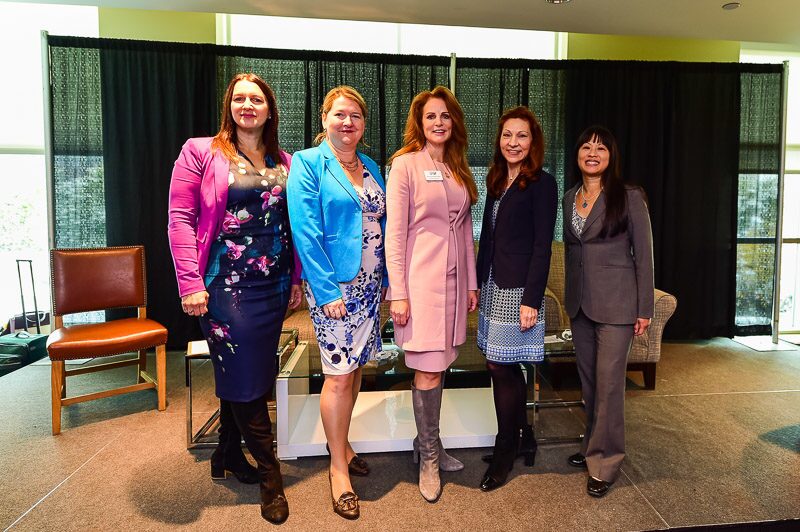The real challenge of attracting and retaining women in the upstream oil and gas industry has nothing to do with gender, said four industry leaders at the inaugural SPE Women in Engineering Committee Breakfast at the SPE Annual Technical Conference and Exhibition. The event was held 30 September in Calgary.
The four—incoming SPE President Shauna Noonan, director of artificial lift engineering for Occidental Petroleum; Helen Chang, chief engineer for Alberta Energy Regulator; Lijs Groenendaal, venture planning transition manager for Shell Exploration & Production; and panel moderator Melanie Popp, director of engineering for geoLOGIC systems—came together to share their thoughts about personal and professional engagement, empowerment, and success with existing and new SPE members. In the course of the discussion, the panelists agreed that the real challenge of attracting and retaining all talent—not just women—is tied to the industry’s unintentional “brand” among people outside it. That brand is characterized by the following.
Negative public perception, particularly as it relates to the environment
Poor boom-and-bust business models
Poor work/life balance
What Has Changed
The consensus among the panelists was that the role of women in petroleum engineering is evolving.
The panelists discussed how mentors, sponsors, colleagues, evolving domestic roles, and the “SPE Village” have helped women survive and thrive in a male-dominated industry that historically based promotion on physically demanding field work, working outside one’s home country, and other factors that put women—especially those who also wanted families—at a disadvantage. Women tended to network with male colleagues or not network at all because there were so few females. Few if any had mentors. To be accepted by the men, they had to be “one of the guys,” not only in how they worked, but also in how they looked.
“FRC (flame-retardant clothing) was exactly the same for women as for men. It didn’t fit and the colors were not at all complementary,” recalled Noonan. And, maternity leave and flex time were nonexistent.
Times have changed. Many countries and companies now have paid maternity leave policies. Popp contributed to “Managing Transitions,” a Canadian document adopted by the Association of Professional Engineers and Geoscientists of Alberta (APEGA) and Engineers Canada that provides tips and techniques to help women manage their careers while offramping or onramping to or from maternity leave.
Information technology that enables people to “take their offices with them” means that women can work remotely, whether from home, overseas, or at a child’s ballet practice. Virtual reality makes it possible to “be there without being there,” reducing travel and making work more life-friendly. SPE has developed a framework of Women in Energy programs. Groenendaal established one in the Netherlands. Noonan is the first SPE president who is also the mother of children who are still at home. Young female engineers want mentors; so do more experienced women. Experienced women want to mentor the younger ones, and it doesn’t stop there.
Younger women also want and are getting sponsors—women who are a few rungs ahead on the career ladder and can pull them up. And, in some areas, 30 ̶ 50% of leadership teams are women.
“There is a different conversation now,” said Noonan. “It is widely accepted and appreciated that women are different beasts. We need to be, and have proved that we can be just as competent a part of the team as our male colleagues, but you don’t have to act like one of the guys when you have equal representation.”
Challenges Remain
Despite the progress, challenges for women in petroleum engineering remain. Chief among them, agreed the panelists, is making their voices heard as strongly as men’s. There is strength in numbers, and SPE’s current membership is only 17% female.
There is still work to be done on helping more women gain access to highly technical leadership roles. And, companies need to redefine many roles, and recognize and reward nontechnical roles. “We won’t really move the needle significantly in our industry until we redefine roles to make working in it appealing to anyone who is qualified,” said Noonan.
The four panelists shared tips, tricks, and words of wisdom for women navigating today’s oil and gas industry.
To make your voice heard, understand the value proposition of what you are trying to propose. That is what management wants to hear.
Understand the different cultures, perspectives, and protocols of the locations where you work and the people you work with, and adjust your leadership skills and style accordingly.
Don’t be afraid to listen, observe, and ask questions to understand the dynamics. Everyone appreciates willingness to learn and improve.
Follow and learn about as many career paths as you can.
Imposed mentorships don’t work. Find mentors through natural connections, and don’t limit yourself to one. Find different mentors for different points in your career.
Build your profile, and keep building it.
Promote yourself. Reach out. Find a sponsor. Be a sponsor. Get your work accomplishments noticed and promoted.
Challenge the podium.
Write and leverage SPE papers to gain awareness and support of upper management.
Volunteer to take on projects.
Be willing to outsource some things when necessary, from laundry to childcare.
Get the best childcare you can afford.
Try always to have dinner with your family and do things as a family.
Find flexible employers who will allow you to work remotely at times, including from home.
When you have gotten so much, give back.
Learn to say “No.”
She who controls the pen controls the message.
It takes a good leader to recognize the potential of those coming up the ladder.
The best system is one that relies on merit and the opportunity to demonstrate the merit.


